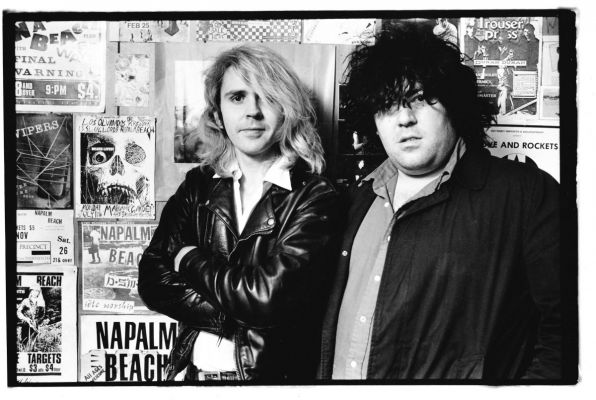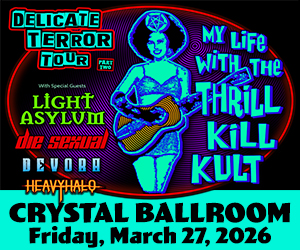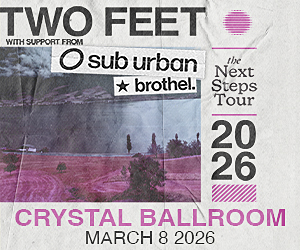Home > Home - Featured
02/24/2022
Sam Henry: A remembrance from a bandmate.
By KELLY HALIBURTON // Portland drummer Sam Henry passed away recently. Read a fond remembrance from one of his bandmates.
My first conscious brush with Sam and his music came sometime in the mid-1980s. I was a teenager living in a small town on the Oregon coast, and I was starved for music. I had recently discovered the raw energy of punk rock and heavy metal and I was buying as many tapes and records as my meagre dishwasher’s salary would allow. On my biweekly visits to Portland I would troll the city’s second-hand music stores for anything that looked fast and heavy. During one of these trips I saw Napalm Beach’s “Teen Dream” cassette in the window at 2nd Avenue Records, one of my favorite shops, and I figured I’d grab it. I mean, the word napalm was in the band name, so it must be heavy, right? Unfortunately, it didn’t deliver on its promise. Singer Chris Newman’s junkie-on-the-prowl moanings weren’t the sort of thing that I was looking for at all, and the band’s proto-grunge heaviness just didn’t resonate with my 16-year-old tastes. This doesn’t sound like NAPALM DEATH at all, I thought glumly as I filed the tape away somewhere in the depths of my collection.
As the years went on, I would see Napalm Beach many times, usually as the opening band at whatever Poison Idea or Obituaries show I managed to make it to Portland to attend. As I began to make friends with people at some of these shows, I kept hearing about this legendary blind drummer, some guy named Sam Henry. The gist was, whatever you thought about Napalm Beach as a band, and however you felt about the band’s prodigious heroin consumption, you couldn’t deny that this whirlwind behind the drum kit was some kind of percussive genius.
When I graduated from high school at the tail-end of the 80s I immediately moved to Portland and jumped headlong into the local music scene. Napalm Beach were at the height of their career and still maintained a presence around the city’s underground clubs, punctuating their runs of local appearances with trips to Europe where, rumor had it, they played sold-out shows in giant halls. The Grunge scene was just gaining momentum, and soon, with the breakout success of an obscure power trio from the damp mill town of Aberdeen, Washington called Nirvana, it would take over the world. Unfortunately, Napalm Beach somehow missed all of this. Maybe they were playing this style too early, maybe their notoriety as dysfunctional junkies ruined their chances at being taken seriously by the stuffed suits at the major record labels – whatever it was, they failed to harness what was needed to generate the fame and financial rewards that so many of their contemporaries managed to garner.
As the 90s progressed, my path rarely converged with Sam’s. I continued to play in Hardcore and punk bands, while Sam continued to play with Napalm Beach. Sam’s drug habit worsened over the years, coming to a climax sometime in the early 2000’s when he was arrested with a significant amount of heroin in his possession. Facing some serious prison time, Sam agreed to participate in a treatment program. This program, combined with a hellish period of heroin withdrawal while behind bars, was enough to convince Sam to change his life for good.
Meanwhile, I’d started to branch out musically, playing in garage rock bands as opposed to the more orthodox hardcore bands in which I’d spent the 90’s playing. It was around this time that I started running into Sam at shows. He had, years earlier, been quite close to my bandmates, Fred and Toody Cole, and had played together with them in the seminal Portland punk band The Rats. Sam started to show up at our shows, and I was immediately struck by his friendliness and outgoing personality. This was the infamous drug fiend of Portland music lore? I found it hard to match this goofy, giggly character with the tales I’d heard, and could only imagine what kind of profound transformation had occurred.
Unknown to either of us, though, another profound change of a different sort was coming: five hours North of Portland, in Bellingham, Washington, a young musician named Jenny was starting to outgrow her small-town scene. At the end of 2008, she packed her battered Astro-Van and headed south on I5. Nobody knew it at the time, but destiny would throw all of us together in ways that would change our lives forever.
When Jenny reached Portland, she hit the ground running. Through a series of fortuitous events, she moved into a communal house in Northeast Portland, a house full of people with connections to the music scene. Through these connections she met Andrew Loomis, infamous former drummer with Portland garage legends Dead Moon. It wasn’t long before Jenny and Andrew began to talk about playing music together. Andrew, however, had entered a stage of his life where playing music was no longer a priority, and it quickly became apparent that Jenny’s goals were a little more ambitious than his. Andrew wasn’t ready to jump back into the constraints of a serious band, but, he told her, he knew another drummer who he’d heard was looking for a new band, an old friend of his named Sam…
Not long after this, Jenny and I began dating. Our relationship brought me into closer contact with her band, Don’t, which by this time had solidified into a functional unit which included Sam Henry on drums.
As time went on and the band developed, my role as “band-boyfriend” evolved into that of driver, roadie, tour manager, and promoter. In this capacity I spent many years touring with Jenny, Sam, and the others until, towards the end of the band’s existence in 2017, I was enlisted as a bass player after the departure of the original bassist. Concurrently, Jenny, Sam and I had formed another band together. Almost as a stylistic experiment, we decided to play country music. Our focus was on the 50s / 60s style of Country / Western music, with an emphasis on the more guitar driven, twangy varieties of the genre. We called ourselves Jenny Don’t and The Spurs, and when we weren’t touring with one of our other, more active bands, we were busy crafting our own brand of garage-tinged country sounds.
Over the last 13 years, I’ve spent a lot of time with Sam both on the road and off. What began as a casual friendship when we’d run into each other at shows developed into a working relationship during the Don’t years, and, eventually, we became as close as family. I’ve spent more time on stage with Sam than with anyone else, and recorded more material with him than with any other bands I’ve been in.
We logged untold hours rolling across distant highways in rickety vans, and endured all of the charged excitement and soul-killing boredom that extensive touring brings. Through it all, Sam was a constant inspiration – this was how I wanted to age: playing music and touring until the very end. This was a guy who, during periods of down-time between tours would grow anxious and start bugging Jenny and I to book more shows so that he could get back on the road. This was a guy who never tired of playing live, and would, unquestioningly, follow Jenny and I on our most hare-brained excursions to whatever far-flung dive bar would give us stage time.
From the sweltering heat of America’s western deserts to the howling frigid wastes of Iceland; from the vastness of Scandinavia to the warmth of the Mediterranean; from Alaska to Florida and from The Netherlands to the Czech Republic, Sam spent the last decades of his life doing exactly what he loved most: making music. From his nest in the back seat of the tour van, Sam would take in the surrounding landscapes though the small telescope that he always brought with him on these trips, never letting his poor eyesight get in the way of his love of travel. His irresistible charm won him scores of friends in dozens of countries, and everywhere he went he found friends – old and new – with whom to share drinks and laughs.
For someone with his extensive resume as a first-generation punk rocker and a who’s-who list of former bandmates and musical associates, one of Sam’s most endearing qualities was his complete lack of ego-fueled entitlement. All he cared about was making music and making friends. It didn’t matter that he was an Oregon Music Hall of Fame alumnus, and it didn’t matter that his early musical output with The Wipers had been cited as a major influence by some of the biggest rock bands of a generation. While it irked him somewhat that his current bands remained relatively under-appreciated, he was happy to play anywhere at any time.
Sam’s final days were spent doing exactly what he loved to do. Our band had just completed a two-week tour of California – a much-needed sunny respite from the gloomy Oregon winter – when Sam went straight from the tour van to the Emergency Room. He had started complaining of abdominal pains while we were on the road, and it progressed to the point that we’d had to cancel our final show. We drove back to Portland and took Sam to the hospital, where he spent a week undergoing tests to figure out what was happening to him. The news, when it came, wasn’t good: Sam had inoperable cancer. Within two weeks, Sam would be dead.
Sam’s passing has been devastating to those closest to him – his girlfriend Heidi, his bandmates, and his family – and to all of his friends and fans both at home in Portland and worldwide. While he leaves behind a musical legacy broad in its stylistic scope and rich in its quality, it’s the music that he never got a chance to play that is just one of the tragedies of his passing. Sam was nowhere close to being ready to retire, and, at the age of 65, he didn’t seem to be slowing down. On recent tours he’d been convinced to leave most of the heavy lifting to his younger bandmates, but he could still play night after night and barely break a sweat.
Sam was a one-of-a-kind, larger-than-life character, a true creative spirit and a caring friend. His lifelong dedication to his craft marks him as a vanishing breed of musician. He was an inspiration to many aspiring young players, and the music he created will last for generations to come.
Comments
Mark Sage
Thank you, Kelly for the great words about Sam. While I have known Sam for 40+ years, you shared a closeness that is unmatched (well, Heidi is an exception). We share in the love of Sam, yet yours is greater.
Take Care
Carla Jean Hall
Thanks for sharing this, it means so much to know Sam was able to spend his last years doing what he loved. Happy Trails Sam, you were the best.
Staffan
Great rememberance, thanks tons. Sam will be sorely missed. Such an extraordinary person and drummer. Glad I got to see him with Don't a couple of times.
Peter Williams
I knew Sam throught a mutual friend while playing in a mostly cover, but some originals band that played a lot in Milwaukie in the late 70s. He was very friendly and laid back. We were both drummers. I think he sat in a couple times. I went over to his house once and we jammed on drums. He taught me a new technique on the bass pedal that led me from all flat foot to a more rock heel-up position. RIP Sam.









Zelda McCarthy
Love this beautiful eulogy …
Love this band …
Small enough that I can focus on each band mate .